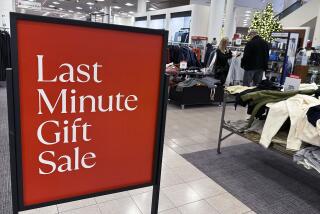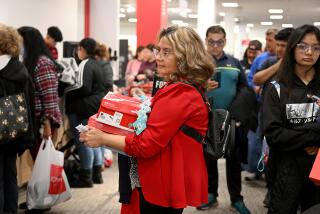Retailers try to put positive spin on their creep into Thanksgiving
When retailers opened on Thanksgiving last year, workers protested outside stores and holiday purists grumbled online — a distracting sideshow in what ultimately proved to be a less-than-robust sales season.
Still, 35 million Americans showed up at shops and on websites, a 21% increase from the holiday turnout in 2011. This year, more retailers are planning to open on turkey day than ever before, and often much earlier than in past holidays.
But this time, they’re taking extra care to present themselves as appreciative of their employees and respectful of the holiday, although not everyone is buying it.
“Last year, employees could still eat with their families and get to work on time,” said Britt Beemer, founder of America’s Research Group. “Now, retailers are opening up earlier and cutting into the dinner hour, so they have to go on a charm offensive.”
Among the publicly announced perks offered for those who will work Thanksgiving: a 25% discount on a holiday season purchase from Wal-Mart Stores Inc. A relaxed dress code of jeans and sneakers at Toys R Us Inc. And Kohl’s Corp. will provide funds for each store “to help ensure the day is a fun one for associates.”
At Gap, Old Navy and Banana Republic, spokeswoman Andrea Hicklin said, many workers say they enjoy working on holidays and that stores are encouraged “to provide festive holiday additions, including meals, to make the atmosphere as familial as possible.”
Simon Property Group Inc. said it is extending its mall hours to meet “customers’ need for greater flexibility as they seek to fit holiday shopping into their already busy schedules.” One mall is hosting a five-hour, multi-course Thanksgiving dinner catered by a local gourmet market for employees.
Field managers who work the weekend at Simon’s Premium Outlets locations will get a gift basket. Carlsbad Premium Outlets is serving free food and drinks for security staff and janitors on call Thursday and Friday and arranging a shuttle to help employees get from the overflow parking area to the center.
Most retailers offer special wages, usually time and a half. Target Corp. said workers on Thanksgiving and Black Friday will get extra compensation on top of premium holiday pay. Macy’s Inc. said it made out its holiday employee schedule early to allow workers to pick their shifts well in advance “in a move to minimize the impact on associates.”
Wal-Mart said it will give associates who work on Thanksgiving an additional day’s pay, which will equal the worker’s average daily pay in the 12 previous weeks. The same goes for employees working their regular shift during the week, but whose day off falls on the holiday. The company plans to have 1 million workers staffing stores on the holiday.
At the Porter Ranch Wal-Mart, more than 450 of the 472 associates at the store are scheduled to work Thanksgiving. On the menu in the break room: turkey and mashed potatoes prepared by deli workers and other employees, along with side dishes, desserts and beverages, store manager Fernando Reyes said.
“Associates really enjoy that,” he said.
Hardworking employees and happy shoppers will be key for retailers in a season that can account for as much as 40% of annual revenue. The sales environment has been unsteady, shaken by the effects of volatile weather, a payroll tax hike, government instability and continued high unemployment.
The fact that the period between Thanksgiving and Christmas — prime shopping time — is a week shorter than in 2012 only raises the stakes.
A report Monday from Deloitte found that 53% of consumers plan to shop this weekend, down seven percentage points from last year. Of those, 13% intend to head to stores Thanksgiving, down from 23% in 2012.
“This year, retailers are in a very competitive market with a compressed holiday schedule,” said Joseph LaRocca of Los Angeles consulting firm RetailPartners. “They need to open longer to attract more customers.”
Yet for all their overtures toward workers, companies won’t be able to satisfy everyone.
As of Tuesday, 63 Change.org petitions about the Black Friday creep into Thanksgiving had garnered more than 220,000 signatures. More than 25 ask shoppers to boycott stores in order to “save Thanksgiving.” In addition to targeting major retailers, several petitions call out niche chains such as Staples and McDonald’s.
Mike Foley, a member of the Ohio House of Representatives, is working on a bill that would require retailers to pay triple wages to any employee working Thanksgiving or before noon on Black Friday.
At Wal-Mart, holiday practices have particularly struck a nerve.
When one of the discounters’ stores in Ohio set up a Thanksgiving food drive for its employees, activists seized on the event as evidence that the retailer wasn’t paying its workers enough to enjoy the holidays.
Wal-Mart spokesman David Tovar said employees were trying to help co-workers struck by unexpected calamities, such as illness, unemployment of a spouse or devastating weather.
“It’s unfortunate that an act of human kindness has been taken so out of context,” he said in an email.
In an echo of last Black Friday, a coalition of labor groups, community activists and workers plans to protest in front of Wal-Mart stores across the country the day after Thanksgiving. Rallies are scheduled in Ontario and Crenshaw.
Peter Dreier, a professor of politics at Occidental College, calls Black Friday “a new labor day” for activists.
“We’re seeing protests by a wide spectrum of Americans,” he said in a conference call with labor organizers. “It’s really become a rallying point, not just Wal-Mart workers but a large group of people in society standing up against the widening divide.”
But Glenn Spencer, vice president of the Workforce Freedom Initiative at the U.S. Chamber of Commerce, said in a statement that the efforts would draw few Wal-Mart employees and amounted to “boisterous street theater.”
Many analysts believe that retailers’ Thanksgiving opening times will continue inching earlier until all-day holiday shopping will be considered de rigueur. But until then, the industry is trying to ease Americans into accepting the idea.
“There’s a period of socializing it with the employees, which is part of why the perks are being made so public,” LaRocca said. “Consumers, though, will go with their wallets.”
But not Landry Major, a Calabasas photographer who said she does most of her shopping online and tries to patronize small, local businesses. She said employers who ask their workers to clock in on holidays are “just awful.”
“All of these poor people aren’t going to have a choice — even if they don’t want to, they’re going to have to work,” Major said. “Who’s going to take care of their families?”
Twitter: @tiffhsulatimes
More to Read
Inside the business of entertainment
The Wide Shot brings you news, analysis and insights on everything from streaming wars to production — and what it all means for the future.
You may occasionally receive promotional content from the Los Angeles Times.











